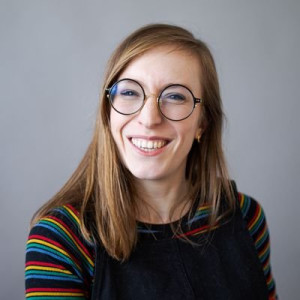This thought piece is part of a series sharing key insights from Constellating Change, our 2023/24 learning and practice series that shone a light on the dynamics and patterns of organising for systems change. It is written by Anna Birney, CEO (Chief Enabling/Evolving Officer) at the School of System Change.

How should we best relate to and organise around where and how our resources and money flow?
What if talking about money didn’t make us hide but made us happy? What if it could unlock our creativity and help us work differently?
Meet Our Contributors
Money Reveals How We Organise
Follow the flow of resources and money, and you pick up the reinforcing currents of deeper societal dynamics - capitalism’s addiction to growth, the uneven distribution of global wealth, the patriarchy, the inequity of funder/grantee relationships. The movement of money reveals the shape of the system. Money is where friction often arises in our relating and organising work, as it connects deeply to how we feel valued by ourselves, others and the system.
We tend to trust commonly used financial or resourcing models, that are often based on accumulation and follow dominant power dynamics. What would it take to disrupt this force of the status quo and find different approaches with more equitable distribution, based on trusting relationships and healthy value exchanges - ways that actually make us feel happy?
Examples From the Possible to the Radical
In this session we explored how money and resources can act as leverage for wider systems change. Our contributors offered some places to start, as well as more radical routes, to help us see what might be possible.
“These flows often act like DNA in projects and organisations; invisible, flowing under the surface but having a really big impact on culture, relationships, dynamics - the things above the surface that we can see” - Zahra Davidson
Francesca Pick, Collaboration catalyst, facilitator and organisation designer, kicked us off with a radical alternative: how can we integrate complexity into our budget distribution decisions, and move away from just calculations in spreadsheets?
Francesca shared the Happy Money Story practice used in her collective, Greaterthan. This approach involves having a conversation about how much people will get paid for the work they do in projects, so that everyone feels happy with the outcome - not just accepting “I can live with this”, but in a way that people feel happy in their body. This requires trust and builds in a group of people as they use it over time. Listening to this story it was interesting that, over time, the group of people using this method started to focus much more on a ‘needs’ rather than ‘value’ based approach, and began to get more creative with what they were doing. Trust does build.
“We are not going for consent - we are going for happy, happy in your bones happy.” -Francesca Pick
Zahra Davidson, Co-founder and Chief Exec at Huddlecraft, shared her Sufi upbringing where she was taught that “money should not stick to the palms of your hands, but should pass across the palm like water.” This has shaped years of experimenting with different practices of distributing money at work and in projects, from a responsive pay formula at Huddlecraft, to working with the Open Collective approach of transparent allocation of grant funds that shifts the accountability from the funder to the relationships in the group.
These experiments raise questions like, ‘how do we create equivalent accountability within a collective when we take a devolved approach to distributing resources?’ A lot of the models Zahra shared aren’t necessarily about an outcome or formula, but more about the process of designing and having the conversation together, about what we want the ‘financial exchange’ to represent and value.

Trust the People / Trust the Model
We noticed that different approaches and practices are needed across different scales, especially as a lot of these methods are about trusting either each other and the values embedded in any formula that you choose to use. At the scale of a few people you can have the hard conversations and build that relational practice over time, as with the Happy Money Story example. Yet when you start to zoom out, you need to weave in and make decisions about what you want to integrate and include in any given model, and consider where accountability might lie - how a process might support the group and individual, or how to value length of experience in pay structures.
Working on Our Inner Money Story
On the call we acknowledged that this system is also within us. We all often struggle with our own relationships with money. We can hide away from these questions and be resistant to looking at things differently.
Having an awareness of our relationship with money is critical to this work. Our session check-in invited participants to share their different relationships with money, and reflect on how that impacts how they see their work; especially as we move out of transactional ways of organising, for example from a model where most people are employed by organisations to one where we work more collaboratively in collectives.
We agreed that we need to walk carefully into this work as there are deeper psychological dynamics that emerge as you look at your inner narratives - as well as the conflict that can arise when our personal approaches or views are not aligned with the practices within an organisation or funder. It can be hard to advocate for your situation and need, as money is where the personal meets the professional.
Taking It Home
As a team running the Constellating Change Learning and Practice Series, this session inspired us to go through a little experiment together on how to split the income from the programme as a mixed team of employees and contractors all working in collaboration.
As we didn’t know the final amount raised by the series, we looked at a formula of how we might value our time - based on literal time, but also the level of holding, doing (see our blog in this series on roles and contributions) and role experience, splitting % shares between us. We then reviewed it at the end of the project, asking ourselves not just was this fair, but also how do we feel about it - do we feel happy with the propositional share?
We noticed the level of safety and trust we felt as a group working together for a while and gave attention to power dynamics. As a consequence of this conversation we adjusted the formula and agreed on a split amount.
We are now looking at how we integrate this into our wider work with contracting and collaborating with our partners.
Learning and Practice Invitations
Are you ready to lift the lid on what is underneath your personal and situational money stories? Try holding some of the following questions:
- What do you associate with resources and money? What is your own money story?
- How might we bring a positive perspective?
- How might we disrupt our own relationship with money?
- How do we increase our financial literacy?
- What are the enabling conditions we might need - be it if you are in an organisation or trying to constellate differently? If you are an employer, funder or employee, contractor or grantee?
- What is the little experiment you might design - be it at home or work?
- What might be the radical intent?
Deeper Dive Resources
Recommended by contributor Francesca Pick:
- Blog: Francesca Pick, ‘Happy Money Story: Decoupling remuneration from calculation’ (2022). Published on the Greaterthan website.
- Blog: Charles Davies, ‘The happy money story game’ (date unknown). Published on Charles’ website.
- Event: Greaterthan, ‘The Money Game Experience’.
- Wiki: Greaterthan, ‘Financial Agreement’ (2024). Published on Greaterthan’s Gitbook.
Recommended by contributor Zahra Davidson:
- Blog: Zahra Davidson, ‘Liberatory Technology: the transformative potential I see in Open Collective’ (2023). Published on the Transformational Governance Universe Medium.
- Blog: Zahra Davidson, ‘Piloting a transparent pay formula’ (2023). Published on the Huddlecraft Medium.
- Podcast: Ratio Talks, ‘Romy Krämer on Guerrilla Funding’ (2024). Shared via the Ratio website.
More resources:
- Website: The Decolonizing Wealth Project.

Written by Anna Birney
If you're interested in bringing this learning into your organisation or network, get in touch with Sean, our Learning and Practice Partner Lead. To keep inquiring with us as we explore more themes, subscribe to the School newsletter for systems change insights, inspiration and resources.







